New Delhi: 2 June, 2025; The Chief of Defence Staff (CDS), General Anil Chauhan, has stirred controversy by openly acknowledging significant losses of Indian fighter jets in recent years. His admission has sparked a renewed debate over the Modi government’s handling of defence procurement policies and long-term military preparedness.
General Chauhan’s remarks have reignited concerns among strategic experts, who have long warned of inadequate planning and delayed execution in modernizing India’s air combat capabilities. Critics argue that the government’s lack of urgency in finalizing timely aircraft deals and ensuring indigenous manufacturing through technology transfer has severely affected the operational strength of the Indian Air Force (IAF).
Retired Wing Commander Anuma Acharya pointed out that the IAF has been operating with a squadron strength well below sanctioned levels. “After the Kargil conflict, we were already short of around 12 squadrons. The Defence Review Committee at the time made critical recommendations, but unfortunately, they were not followed through sincerely,” she said.
Experts highlight that successive governments have failed to maintain continuity in procurement policy. However, many defence analysts credit the United Progressive Alliance (UPA) government under Dr. Manmohan Singh with initiating substantive efforts to modernize the air force. These included pushing forward the Rafale deal and acquiring state-of-the-art helicopters like the Apache and Chinook.
“The groundwork for the Rafale jets was laid during the UPA era with a strong emphasis on cost transparency and technology transfer,” said a retired Air Marshal. “But in the last eleven years, especially under the current dispensation, there has been a visible slowdown in defence modernization, and the final Rafale deal came under intense scrutiny due to non-transparent price escalations and lack of clarity on offsets.”
Adding his voice to the criticism, former General Mohan Bhandari expressed disappointment over what he termed as the Modi government’s lack of a coherent military-diplomatic strategy. “We need to train our front-line military leadership with both caution and clarity. Defence leadership must not only be battle-ready but also well-versed in handling sensitive public communication to avoid such controversies,” he remarked.
The CDS’s candid statement has opened the floodgates to political and strategic questions on India’s readiness for future conflicts, especially in the backdrop of growing regional threats. As the nation looks to balance indigenous defence production with critical imports, the need for a transparent and long-term policy framework has become more urgent than ever.
( Writer is a senior Journalist and Political Commentator)






